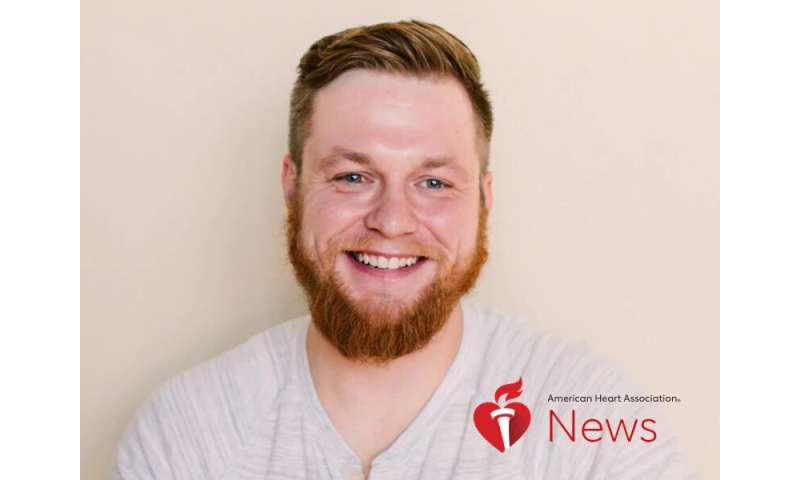
Nearly ready to deliver her first child, Ashley Goette woke up at 5 a.m. to go to the bathroom and nudged her husband, who seemed to be snoring. Andrew made a scary, gargling sound, so Ashley ran to get his asthma inhaler.
When his only response was gasping for air, Ashley called 911, telling the operator she thought she needed to do CPR.
After a few questions, the dispatcher determined Andrew was in cardiac arrest and coached Ashley how to perform CPR. She continued compressions for five minutes until help arrived, and paramedics shocked Andrew’s heart back to life.
“In my head I just kept thinking, ‘This can’t be happening. We are having a baby tomorrow. This can’t be happening. There’s no way this is happening,'” Ashley said.
At the hospital, doctors placed Andrew in a medically induced coma to protect his brain and let his body rest and heal. An MRI and CT scan showed his brain was significantly swollen.
“They were talking in medical terms and I pretty much sat there completely blank,” Ashley said. “All I kept hearing were the really low chances of him surviving.”
As the medical team dug into Andrew’s family medical history, they learned his uncle had a heart attack linked to Wolff-Parkinson-White syndrome. The disorder can cause the heart’s electrical pathways to malfunction. An electrocardiogram confirmed Andrew had it.
The next day, doctors began slowly raising his body temperature. They told the family it could take days or weeks for him to show signs of life. As Ashley searched her phone for a familiar song to play for Andrew, his father noticed Andrew’s shoulders move. The nurse asked Andrew if he could open his eyes.
“He literally sat up and opened his eyes,” Ashley said.
Andrew was shocked and confused to find himself in a hospital bed.
“I don’t think I grasped quite what happened for quite some time,” he said.
Nurses asked Andrew if he remembered his name, the last holiday, what year it was and who was president. He got all the answers right. Then they asked if he remembered he and Ashley were having a baby. He did.
After a change in plans, Ashley was ready to deliver their son at that hospital in St. Paul, Minnesota. The staff brought Andrew’s hospital bed to the labor and delivery room, where Ashley labored for 22 hours before doctors said she needed a cesarean section. From the operating room, Ashley’s sister used FaceTime so Andrew could watch the birth.
“I remember watching on the phone and waiting by the door for them to walk through the door with my son,” Andrew said.
Lennon, nicknamed “Lenny,” was named after John Lennon. When the couple was trying to think of names, John Lennon’s song “Beautiful Boy” came on the radio. Ashley tossed out the name and Andrew agreed.
“The first line in ‘Beautiful Boy’ is, ‘Have no fear … your daddy’s here,’ which could not have been more fitting,” Ashley said.
Before leaving the hospital, doctors fixed Andrew’s heart rhythm disorder by cauterizing the extra electrical pathways in his heart. Doctors also sent him home wearing a vest-like device to deliver an electric shock to interrupt a dangerous heart rhythm, if needed. A test three months later determined Andrew’s heart was fine. He hasn’t had a heart issue since that day in October 2018.
“I never had an issue that I knew of before. Now that I know what it is, I can look back and be like, there were times where that’s probably what was happening to me,” Andrew said.
Like times when he was working out, playing boot hockey or coaching high school wrestlers and felt tired, lightheaded, short of breath or nauseous. There was never any chest pain. He thought maybe he was out of shape or just getting older.
Currently, he and Ashley volunteer with the American Heart Association to advocate for legislation in Minnesota that would ensure all 911 operators are trained to coach callers through performing CPR while waiting for help.
Source: Read Full Article